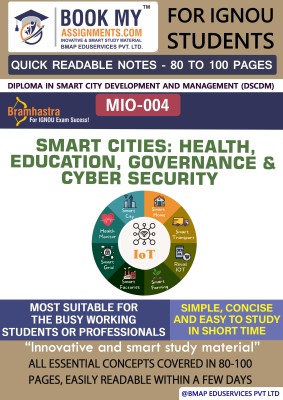IGNOU MIO 004 Smart Cities: Health, Education, Governance & Cyber Security Study Guide (Quick Readable Notes) for Ignou Student.(Paperback, BMA Publication)
Quick Overview
Product Price Comparison
IGNOU MIO 004 (Smart Cities: Health, Education, Governance & Cyber Security) involves summarizing key concepts, strategies, and technologies related to smart city development in the domains of health, education, governance, and cybersecurity. Here's a structured approach to help you create your own notes:Introduction to Smart Cities:Define smart cities and their objectives in leveraging technology and data-driven approaches to improve urban livability, sustainability, and efficiency.Discuss the importance of integrating health, education, governance, and cybersecurity considerations into smart city initiatives.Health in Smart Cities:Explain the concept of smart health in urban environments, focusing on digital health technologies, telemedicine, remote patient monitoring, and health information systems.Discuss the role of smart health initiatives in improving healthcare access, delivery, and outcomes for urban populations.Education in Smart Cities:Define smart education and its role in leveraging technology and innovation to enhance teaching and learning experiences, student outcomes, and educational equity in urban areas.Discuss examples of smart education initiatives, such as digital classrooms, e-learning platforms, and personalized learning technologies.Governance in Smart Cities:Define smart governance and its significance in promoting transparency, efficiency, and citizen participation in urban decision-making processes.Discuss the use of digital technologies, open data platforms, and e-governance solutions to improve service delivery, civic engagement, and accountability in smart cities.Cybersecurity in Smart Cities:Define cybersecurity in the context of smart city development and highlight the importance of protecting critical infrastructure, data privacy, and citizen rights from cyber threats.Discuss cybersecurity challenges specific to smart cities, such as IoT vulnerabilities, ransomware attacks, and insider threats, and strategies for mitigating risks.Health Technologies and Innovations:Summarize key health technologies and innovations used in smart cities, including wearable devices, health monitoring sensors, electronic health records (EHR), and mobile health (mHealth) apps.Discuss the potential benefits of these technologies in promoting preventive healthcare, early intervention, and chronic disease management in urban populations.Education Technologies and Innovations:Summarize key education technologies and innovations used in smart cities, such as learning management systems, virtual reality (VR) simulations, gamification, and adaptive learning platforms.Discuss how these technologies support personalized learning experiences, teacher professional development, and educational access for underserved communities in urban areas.E-Governance Solutions and Citizen Services:Discuss e-governance solutions and digital platforms used in smart cities to improve service delivery, citizen engagement, and public administration efficiency.Explore examples of e-governance initiatives, such as online service portals, mobile apps, digital identity systems, and participatory budgeting platforms.


